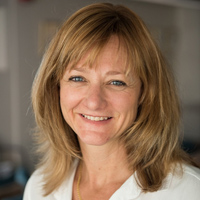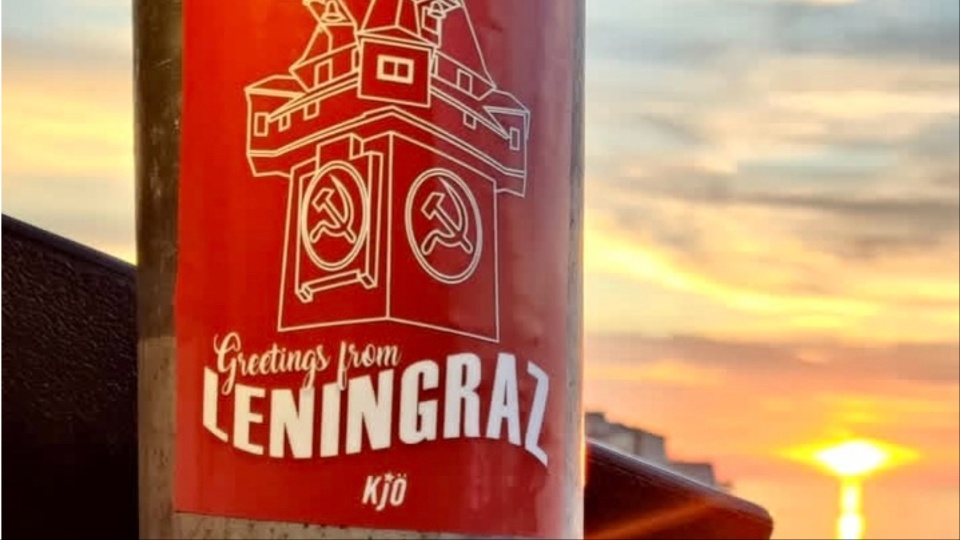
The sun rises in Graz, Austria, shining on a sticker placed on a lamppost by the Communist Youth of Austria (KJÖ) welcoming people to ‘LeninGraz,’ a play on the name of the old Soviet city of Leningrad. | Jon Wilson / People’s World
GRAZ, Austria—Welcome to LeninGraz! Since 2021, Communists in Austria’s second-largest city of Graz have harnessed the politics of class struggle to beat the far right and win the city government. Born out of the failure of institutional party politics to answer the material needs of the city’s working class, the electoral rise of the Communist Party of Austria (KPÖ) began years ago when newly elected KPÖ chairperson, Ernest Kaltenegger, was voted into office as a city councilor in 1998.
He rode a wave of frustration against the embedded political establishment that cared little about daily survival, instead chasing grandiose visions, such as courting the Olympic Games to come to the city. Kaltenegger cemented his reputation when he brought practical solutions that addressed ordinary people’s acute housing needs in the city, solutions that now govern the city’s housing policy.
Over the next two decades, the people of Graz experienced firsthand that communist councilmembers were incorruptible and actually delivered on their campaign promises. They showed the people of Graz that if the communists continued to be elected, the city government could initiate policies that actually improved the lives of its people. They have proved to city residents that, in their words, “we do our work because we are communists.”
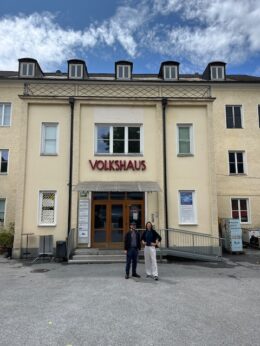 The authors outside the Volkshaus, or ‘People’s House,’ headquarters of KPÖ in Graz. | Photo via Jon Wilson
The authors outside the Volkshaus, or ‘People’s House,’ headquarters of KPÖ in Graz. | Photo via Jon Wilson
In 2021, the KPÖ earned the plurality of votes, gaining more seats in the municipal government than any other party. Graz also gained its first Communist mayor, Elke Kahr. The KPÖ earned the ability to incorporate communist policy throughout the city and shift power from the wealthy and political insiders to the working people.
Kahr joined the KPÖ in 1983 and also built her reputation on housing policy during her time in the city council since 2005. As mayor, Kahr and the KPÖ staff have applied their people-centered approach to transforming transportation policy and to shaping the healthcare mandate in Graz. Kahr now holds portfolios in social affairs, housing, youth and families, and economic development.
In all spheres of governance, Communist councilors in Graz have developed practical Marxist solutions to pervasive inequities of capitalism. These answers provide a system-wide network of services that extend care to everyone who needs it.
On the issue of housing, they developed a tenants’ emergency hotline that provided free legal advice for problems with landlords. They advocated for public housing and built thousands of municipal apartments on the land the city purchased. They set up a security deposit fund and rent subsidies for those facing housing insecurity and expanded assistance to unhoused people.
As Kahr bluntly told People’s World, “Housing is a good example of where the market has deficits. The housing issue is not solved by the market.”
The electoral success of the KPÖ in Graz is strategic and confident. The party runs its candidates openly as Communists who have ideas that are popular. The KPÖ’s campaign slogans bear out their methods: “Helping, not talking!” and “Political engagement is not about career, but about care.” Communist officeholders walk the walk in their salaries as well. They have a monthly salary cap of €1,950 (roughly $2,060) out of an allotted €6,000. The difference goes into the KPÖ-initiated Social Fund to fund residents’ needs.
In 2021, Miriam Herlicska was voted into her seat on the Graz city council. She is one of 15 KPÖ members out of a total of 48 councilors. She’s an outspoken advocate for a socialist vision for Graz. “They keep telling us that at this rate all housing will be public housing,” she said, “and we tell them, yes, that is what we want—public housing.”
When People’s World asked what advice she’d give to Communist candidates running for office elsewhere, she didn’t hesitate. “Don’t harbor secrets, always run on the truth,” she said. “For example, if you can’t afford to move out of your parents’ house, run on that fact!” Her second point is related: “Run as a novelty: You are a ‘breath of fresh air’ in the language of the media. Being a communist should be out in front.”
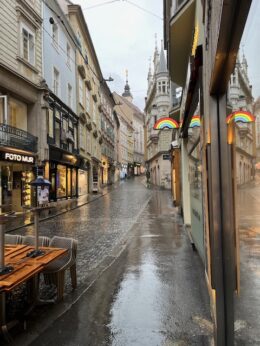 A rainy day in Graz, Austria. | Jon Wilson / People’s World
A rainy day in Graz, Austria. | Jon Wilson / People’s World
Herlicska urged Communist candidates to avoid reliance on social media alone for publicity, saying, “You won’t change the world on that medium.” Instead, she drew on the old lessons of elected KPÖ officials in Graz:
“Be seen on the streets at every possible event, gathering, and festival. Hang up posters and stickers in the public eye. We are the party which is most present in the streets. We talk to everyone, whether or not they will vote for us. They will then say to their friends, ‘I talked to the communist,’ and that keeps us on people’s minds.”
Once Communists are visible to the media, she said, party candidates and members are then often invited to public discussions about the issues.
Even after being voted into office, KPÖ elected officeholders pride themselves on being available and accessible to constituents. Every KPÖ member in office has their cellphone number listed publicly, and the mayor meets with people every Saturday and Sunday in open conversation hours. The Communist councilors’ slogan—“Work with the people, not just for them”—refers to their deep knowledge of the problems faced by their constituents and their willingness to work together toward solutions.
Josef Meszlenyi, responsible for the local politics of the KPÖ in the state of Styria, described their core methods:
“Begin in the fields where you can make a difference, such as social projects that include consultations with trained social workers. Bring tangible solutions—pay a bill, stop an eviction. We need to get them what they need on a daily level. We need to believe that their trust in the small questions leads to trust in the big questions.”
Another KPÖ councilor from the labor movement, Kurt Luttenberger, agreed with that advice and added to it. “Know what you can accomplish given the office you are running for,” he said. He talked about how the local council in Graz cannot create laws, so they have used local referendums to push the politics in their state of Styria.
Luttenberger told of how the party initiated a referendum at the city level of Graz back in 1997, asking whether people wanted to privatize public housing, a development which was seemingly a done deal thanks to neoliberal policies at the higher levels of government.
They went person-to-person, door-to-door, collecting signatures across the city. The Communists’ work paid off when they proved that 82% of the people did not want to privatize housing. Their referendum successfully pressured politicians from selling public housing for quick money. Two years ago, they delivered another petition that sought to cut the rising rental rates at the regional parliament and used this fight to gain seats at the regional and the federal level.
As Luttenberger said, “The Communists in Graz have an ear to the sorrows of the people.”
Additional advice from Herlicska was entirely practical: “Rely on young people and work with the young people running for office. And, when in discussions with other politicians, be respectful, polite, and confident.”
Everyone in the KPÖ stressed the importance of developing a party newspaper that remains independent from corporate media outlets. Every household is mailed the Stadtblatt, a city-based newspaper in Graz published by the KPÖ five to six times a year, with a special edition that communicates the outcomes from the yearly state council meeting.
The story of a Communist resurgence in Graz is spreading in other towns and cities of Austria, even in the face of the rise of the right wing nationally. Salzburg, Linz, and Innsbruck all saw marked gains for the Communists during the 2023 and 2024 elections. Their strategy has been to focus on areas that already have an idea of what the KPÖ stands for, as well as those areas with low voter turnout, to give a real alternative to residents disgusted with politics as usual.
In Vienna, more and more people are casting a protest vote against the right wing in favor of Communist candidates. Before, they used to vote for social democrats, but the strength of the KPÖ and its vision for change make the Communists more viable candidates.
Social democrats are currently in a coalition with the right wing, Herlicska said, “since that’s easier for them as a do-nothing party. They have an administrative role, not a political program. In the 2021 election, we received people’s votes who would have voted for the right-wing Freedom Party because we are the party of protest.”
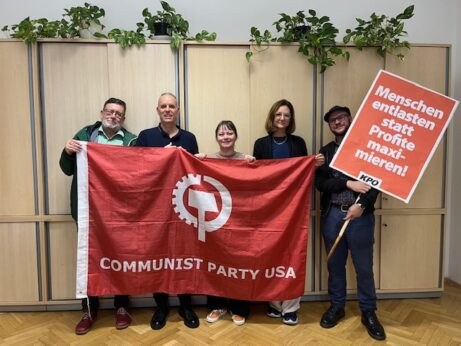 CPUSA meets KPÖ – From left to right: Kurt Keltenegger, Jon Wilson of the CPUSA, Miriam Herlicska, Lisa Armstrong of the CPUSA, and Josef Meszlenyi at a meeting at the Volkshaus (People’s House). The sign translates, essentially, to ‘People Before Profits.’ | Photo via Jon Wilson
CPUSA meets KPÖ – From left to right: Kurt Keltenegger, Jon Wilson of the CPUSA, Miriam Herlicska, Lisa Armstrong of the CPUSA, and Josef Meszlenyi at a meeting at the Volkshaus (People’s House). The sign translates, essentially, to ‘People Before Profits.’ | Photo via Jon Wilson
After the 2021 election win, Herliscka and Luttenberger described how the right wing and social democrats in the media tried to revive anti-communism but met with little success. “But that doesn’t mean that anti-communism in the media is always unsuccessful. It can stick. They also try not to talk about communists—something we have to combat by being everywhere on the issues and in the public. For example, after 2021, one article in a mainstream paper said, ‘Their success has nothing to do with them being communists.’ And on the next page, an article said, ‘The KPÖ is a terrifying Communist Party!’”
The newspaper tried to have it both ways: Communism is meaningless, and communism is terrible. “No one was buying it due to strong support for the mayor and city council members.” Their story illustrates a lesson that Kahr has learned: “People vote for people. They have to be able to associate faces and names with a party. This understanding has sometimes caused irritation in the KPÖ, because some people believe that programs are enough.”
The KPÖ’s electoral success in Graz comes from an understanding that Communist ideas based on class struggle are popular and that a winning campaign needs to gain the trust of the people by working with the people. For the KPÖ, political campaigns start in the streets by listening and then developing tangible solutions. A politics of sacrifice—whether paying someone’s utility bill or leading the fight to stop an eviction—shoulders the everyday struggle of working people at both the personal and municipal level.
Other Communist Parties around the world have also experienced success at the municipal and regional level, running people-centered campaigns. The strategy in Graz draws on these lessons and offers a contemporary set of electoral strategies guided by the political mission of a Communist Party with working-class needs and values at its heart.
We hope you appreciated this article. At People’s World, we believe news and information should be free and accessible to all, but we need your help. Our journalism is free of corporate influence and paywalls because we are totally reader-supported. Only you, our readers and supporters, make this possible. If you enjoy reading People’s World and the stories we bring you, please support our work by donating or becoming a monthly sustainer today. Thank you!
